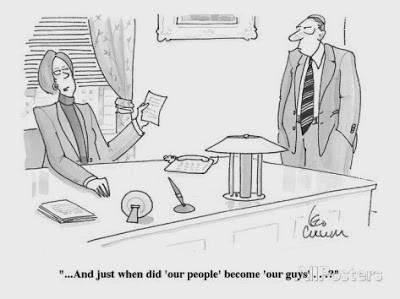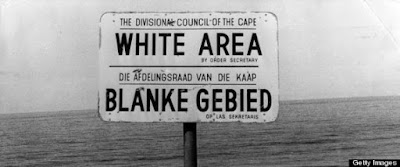Just One of the Guys

I have this theory about language in the disability sector.
After a while, everything becomes a bad word.
Five years ago, 'retarded' was a commonly accepted term within the American disability community. Now it's regarded (rightly) as a slur - an awesome campaign, spread the word to end the word, has made people change their language and their attitudes.
But does everything become a bad word? And why?
I listen to service providers and community organisations talk about their - wait for it - clients, service users, participants - in either careful terms or in affectionate ones.
Invariably, they will talk about their (intellectually disabled) clientele as 'our guys'.
It got to the point where the term made me wince, and I wasn't sure why.
A couple of rules for the use of the term 'our guys'.
It's used indiscriminately, whether you're male or female.
It is usually only applied to people with an intellectual disability or people who are in congregate recreation or residential arrangements.
Your voice warms when you talk about 'our guys'. You're fond of them, of course. Our guys.
It's all a little patronising.
I remember when my husband's mother was very ill in hospital, near the time of her death. She was in her late seventies, and the nurse spoke loudly to her, calling her Alice. She corrected her quickly - 'It's Mrs Haydon-Wood.'
I think of that often when I hear older men and women with disability referred to as Pat or Shane or David or Irene. They are never given the title of Mr, Mrs or Ms, let alone entitled to the other dignities that we afford our other senior citizens.
Our guys.
What would happen if we changed our language? Why, we might have to change the way we do business.
No more separate lunch rooms with 'employees' and 'staff' if the employees at the sheltered workshop are all - well, employees.
What would happen if those 'recreation options' became membership based organisations? You know, like normal darts clubs and bowling clubs and youth organisations have. Real membership based organisations, with 'members' instead of 'participants', with people having direct input in the way they want their organisation run, with meetings and Chairpersons and agendas and governance.
I want 'our guys' to become 'that guy' or 'that lady', like anyone else. Don't all people deserve to be treated with the respect we give to other people?
Click here for the sound track.
I've got our guys on the bowling team
Every Thursday living the dreamI guess you'd say
What can make me feel this way?
Our guys (our guys, our guys)
Talkin' 'bout our guys (our guys).
They got wages, through the old BSWAT
Dollar sixty an hour, that’s how much they got
I guess you'd say
What can make me feel this way?
Our guys (our guys, our guys)
Talkin' 'bout our guys (our guys).
Hey hey hey
Hey hey hey
Ooooh.
They don't need no money, fortune or fame.
Doing something every day, our only aim.
I guess you'd say
What can make me feel this way?
Our guys (our guys, our guys)
Talkin' 'bout our guys (our guys).
I've got our guys on a cloudy day
With our guys.
It is the same day after day…



Excellent read as always Sam :-D .Carole aka Mewsli
ReplyDeleteYes to all of the above!
ReplyDeleteThere is actually a term that kind of refers to this phenomenon within language. Basically, something is too unsightly to be referred to accurately, so a euphemism is used to refer to it. That word then spends long enough being associated with the unsightly whatever-it-refers-to and becomes a pejorative word (often used as an insult). It then gets a new socially acceptable euphemism that gets back on the treadmill of becoming socially unacceptable. Steven Pinker called this the ‘euphemism treadmill’.
It’s a phenomenon perpetuated by those who seek to make things more socially acceptable by assimilating without changing underlying intolerance. The need to use a euphemism at all implies that accuracy is socially unacceptable. (I might be wrong here but) the r-word wouldn’t have become an insult had people not thought that calling someone intellectually disabled was a bad thing.
It reminds me of people first language. They change the language to say ‘don’t worry, it’s not true!’ rather than change the attitude that would make anyone think that a disabled person shouldn’t possibly, God forbid, be defined by a disability, for it would define their entire lives as every-disabilities-prejudice-ever. It doesn’t work without other changes.
The example that I yell about the most.. In the '90s the American Psychiatric Association made manic-depressive disorder 'bipolar (affective) disorder', against the objection of ‘experts’ who said that it was inaccurate, because they thought it would be more palatable (Exhibit A of why psych's should stay the fuck out of social justice). Many people thought ‘manic’ sounded frightening - like an untreatable person who was dangerous - so the APA thought that a new name would reduce prejudice by distancing those diagnosed from the word, but of course it become associated with the same misperceptions, and then some new ones. Now we have a new generation of people using ‘bipolar’ as an insult, and a whole bunch of people who think it has something to do with ‘mood swings’ and who underestimate mixed episodes.
That example and what you wrote about your mother-in-law makes me realise that new language attached to those-we-wish-not-to-offend is likely politicised… breeds new misunderstandings, evidences the prejudices yet to be identified by those who make it.
Not to make it painfully obvious that I’m stalking your socials (circadian rhythm disorder life) or anything…
Kara aka whatever blogspot calls me when I post this.